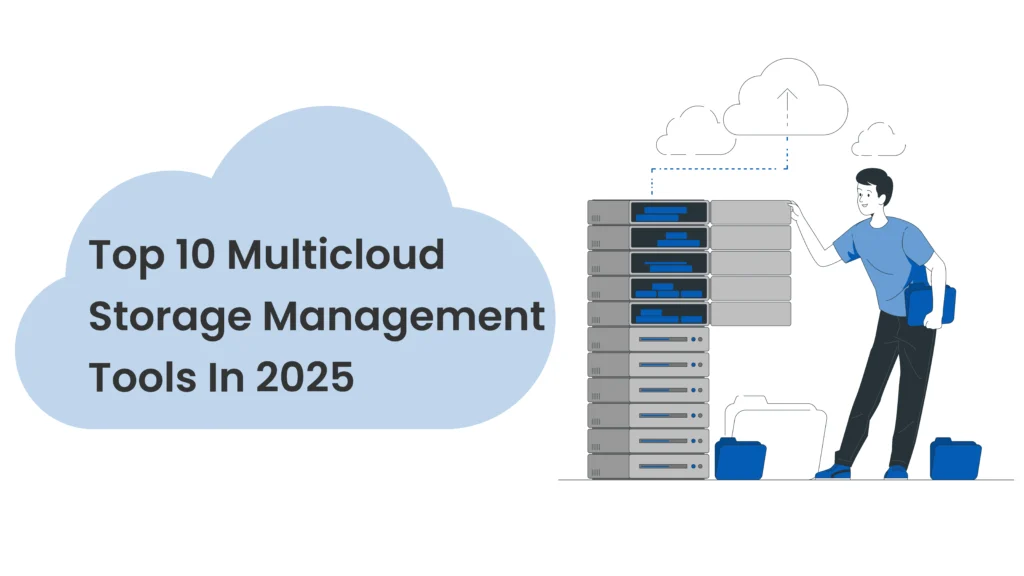Let’s face it—juggling multiple cloud platforms can quickly become a tangled mess. Files in Google Cloud, backups in AWS, apps syncing with Azure—it gets hard to keep track.
- June 25, 2025
- Abiya K
- 10:00 am
Best Cloud Storage Management Platforms 2025
Let’s face it—juggling multiple cloud platforms can quickly become a tangled mess. Files in Google Cloud, backups in AWS, apps syncing with Azure—it gets hard to keep track. That’s where a solid multicloud storage management solution becomes more than helpful. It becomes essential.
In 2025, the right tools can help teams manage data smarter, sync effortlessly across providers, and gain complete visibility—without the stress. Whether you’re scaling, consolidating, or simply trying to clean things up, these are the best cloud storage tools to consider right now.
1. Fylioo
Fylioo is quickly carving a niche as a reliable, clean, and intuitive option for multicloud storage management. It brings together cloud syncing, error tracking, performance monitoring, and centralized file access—without the learning curve.
Everything sits under one dashboard, making it easier to stay on top of your storage without hopping between platforms. For businesses tired of juggling disconnected tools, Fylioo delivers the simplicity that makes cloud storage finally feel manageable.
2. Google Cloud Storage
Google Cloud’s object storage solution is built to scale. It connects seamlessly with Google’s larger ecosystem—making it easy to move, store, and analyze your data across projects. You get lifecycle management, regional redundancy, and a simple structure that’s hard to beat for clarity and speed.
3. AWS Storage Gateway
AWS provides the flexibility to integrate cloud storage with on-prem environments through its Storage Gateway. It supports file and volume-based storage, offers smooth backup options, and ensures low-latency access for your frequently used data. Ideal for hybrid setups.
4. Microsoft Azure Storage Explorer
This tool brings a clean, GUI-driven way to manage blob, file, and queue storage. It simplifies access to complex Azure environments, so even larger cloud footprints can be managed in a user-friendly way. Whether you’re uploading files or managing containers, Storage Explorer keeps things straightforward.
5. Wasabi Hot Cloud Storage
Known for its no-egress-fee policy, Wasabi offers fast, low-cost storage with S3 compatibility. It’s a favorite among teams that need dependable, high-speed performance for backups and media storage—without breaking the bank or worrying about hidden charges.
6. IBM Cloud Object Storage
IBM’s storage solution handles structured and unstructured data at scale. With built-in redundancy, automated tiering, and support for high-compliance industries, it’s a strong option for companies that need storage they can trust to perform under pressure.
7. NetApp Cloud Volumes ONTAP
NetApp delivers storage automation, intelligent tiering, and detailed performance metrics across AWS, Azure, and GCP. Whether you’re optimizing costs or running high-throughput workloads, it provides the flexibility to control and monitor your storage footprint in one place.
8. Backblaze B2 Cloud Storage
Backblaze keeps things refreshingly simple. With transparent pricing, developer-friendly APIs, and reliable S3 compatibility, it’s a strong choice for teams looking to store large volumes of data without unnecessary complexity.
9. VMware vSAN + CloudHealth
This combo offers deeper visibility across your virtualized infrastructure and public cloud assets. Teams can track storage usage, performance, and costs while fine-tuning configurations to ensure everything stays efficient and predictable.
10. Box Shuttle
Box Shuttle supports large-scale file migrations between systems while maintaining compliance and data governance. It simplifies the transition into cloud-based collaboration for organizations looking to modernize their file management infrastructure.
What Should You Look for in a Multicloud Storage Tool?
The best tools don’t just store your data—they give you the clarity to manage it, protect it, and scale it with confidence. The ideal multicloud storage management solution should help you:
- Sync and access files across cloud platforms
- Manage storage costs and usage efficiently
- Maintain security and compliance with ease
- Centralize visibility to reduce IT overhead
In short, the best cloud storage tools empower you to spend less time managing systems—and more time moving your business forward.
Final Thoughts: Simplify, Secure, Scale
It’s never been more important to get a handle on your cloud storage. With data flowing between teams, tools, and territories, having a single point of truth helps you stay ahead of the curve.
Whether you’re leaning toward a well-established name or something new like Fylioo, the right multicloud storage management tool can turn your storage from a scattered mess into a streamlined asset.
Looking for a tool that fits your storage style?
Start small. Explore. And choose a platform that grows with you—not against you.
FAQ
Fylioo stands out for its unified dashboard that connects AWS S3, Azure Blob, and Google Cloud Storage. It offers seamless syncing, real-time file monitoring, and centralized control—making it one of the most efficient cloud storage tools for modern teams.
Yes, Fylioo prioritizes data protection with end-to-end encryption, secure access controls, and compliance-ready infrastructure across all major cloud storage providers.
Fylioo is ideal for startups, SaaS businesses, and IT teams that need a simple, scalable solution to manage and monitor data across multiple cloud environments without switching tools.

